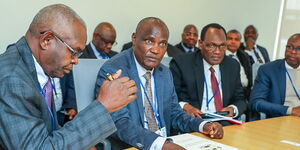The World Bank has raised concerns over the increasing levels of non-performing loans in the Kenyan banking sector, which it argues risk plunging local banks into losses.
In its Country Policy and Institutional Assessment report for Sub-Saharan Africa, the multilateral lender noted that while Kenya's banking sector was sound and stable, non-performing loans remained a major vulnerability.
According to the World Bank in its annual report published on Friday, September 5, the surging levels of non-performing loans expose Kenyan banks to additional losses and could erode their capital buffers.
The report highlights that regionally, non-performing loans are highest in Ghana at 22 per cent, followed by the Republic of Congo at 15.2 per cent, and then Kenya at 14.3 per cent.
"Banking systems in the region are largely sound, but significant vulnerabilities remain. Average capital adequacy ratios are above regulatory minimums in many countries," the World Bank noted.
Adding, "However, nonperforming loans have increased and remain high in some countries, including Ghana (22.8 per cent), Kenya (14.3 per cent), and the Republic of Congo (15.2 per cent)."
In its report, the World Bank also commended some African countries for implementing a fair and transparent taxation system.
According to the lender, fair and progressive taxation was critical for ensuring a sense of public engagement, reinforcing the notion of a fiscal contract.
In particular, the World Bank lauded Kenya for successfully implementing digital tax administration systems, which it says have increased compliance rates and boosted domestic revenue generation.
Additionally, the lender acknowledged the country's efforts to boost digital financial services through the licensing of over 85 digital lenders, terming it a remarkable outlier.
In October last year, the Central Bank of Kenya (CBK) licensed 85 digital lenders. However, the number has since increased to 154 after the regulator licensed an additional 69 digital lenders.
CBK, in a press statement on Thursday, September 4, revealed that since 2022, it had received over 700 applications for licensing as digital lenders, adding that the process of reviewing all the applications was still in progress.
"The focus of the engagements with digital credit providers has been inter alia on business models, consumer protection and fitness and propriety of proposed shareholders, directors, and management," the Central Bank of Kenya noted.

High Court Issues Orders on Ruto-Trump Ksh 200B Deal Breaking News











